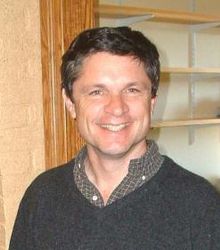Andrew Strominger
This biography of a living person needs additional citations for verification. (December 2017) |
Andrew E. Strominger | |
|---|---|
 Andy Strominger at Harvard | |
| Born | July 30, 1955 |
| Citizenship | USA |
| Alma mater | Harvard College (A.B., 1977) University of California, Berkeley (M.A., 1979) MIT (Ph.D., 1982) |
| Known for | CGHS model Contributions to: String theory Quantum gravity dS/CFT correspondence Kerr/CFT correspondence SYZ conjecture S-brane |
| Awards | Physics Frontiers Breakthrough Prize (2012) Klein Medal (2014) Dirac Medal (2014) Dannie Heineman Prize (2016) Guggenheim Fellowship (2020) |
| Scientific career | |
| Fields | Physics |
| Institutions | Harvard University |
| Doctoral students | |
| Other notable students | Sabrina Gonzalez Pasterski |
Andrew Eben Strominger (/ˈstrɑːmɪndʒər/;[1] born 1955) is an American theoretical physicist who is the director of Harvard's Center for the Fundamental Laws of Nature. He has made significant contributions to quantum gravity and string theory. These include his work on Calabi–Yau compactification and topology change in string theory, and on the stringy origin of black hole entropy. He is a senior fellow at the Society of Fellows, and is the Gwill E. York Professor of Physics.
Education[]
Strominger received his bachelor's degree at Harvard College in 1977 and his master's degree at the University of California, Berkeley. He then received his Ph.D. at MIT in 1982 under the supervision of Roman Jackiw. Prior to joining Harvard as a professor in 1997, he held a faculty position at the University of California, Santa Barbara. He is the author of over 200 publications.
Research[]
Notable contributions[]
- a paper with Cumrun Vafa that explains the microscopic origin of the black hole entropy, originally calculated thermodynamically by Stephen Hawking and Jacob Bekenstein, from string theory
- a paper with Philip Candelas, Gary Horowitz, and Edward Witten in the 1980s about the relevance of Calabi–Yau manifolds for obtaining the Standard Model from string theory
- other articles discussing the dS/CFT correspondence and the Kerr/CFT correspondence (variations of the AdS/CFT correspondence)
- S-branes (a variation of D-branes)
- OM-theory (with Shiraz Minwalla and Nathan Seiberg)
- noncommutative solitons (with Shiraz Minwalla and Rajesh Gopakumar)
- massless black holes in the form of wrapped D3-branes that regulate the physics of a conifold and allow topology change
- the SYZ conjecture, an interpretation of mirror symmetry as a special case of T-duality (with Eric Zaslow and Shing-Tung Yau)
- purely cubic action for string field theory
- superstrings with torsion
- a study of the relationship between asymptotic symmetries in , soft theorems and memory effects
- an analytic calculation of the exact spectrum of gravitational wave emission from extreme mass ratio inspirals (EMRIs) into rapidly rotating black holes (these gravitational waves are expected to be detected with future space-based gravitational wave detectors such as eLISA)
Awards[]
In recognition of his accomplishments, Strominger has been awarded numerous prizes, fellowships, and honorary professorships. These include the Klein Medal from the Royal Swedish Academy of Sciences and the 2014 Dirac Medal from the Abdus Salam International Centre for Theoretical Physics, which he received for his contributions to the origin, development, and further understanding of string theory. Furthermore, he received the Physics Frontiers Breakthrough Prize from the Milner Foundation along with colleague Cumrun Vafa in 2014. This award was bestowed upon the pair in honor of their "numerous deep and groundbreaking contributions to quantum field theory, quantum gravity, string theory and geometry." The Foundation also recognized their "joint statistical derivation of the Bekenstein–Hawking area–entropy relation unified the laws of thermodynamics with the laws of black hole dynamics and revealed the holographic nature of quantum spacetime." In 2020, he received a Guggenheim Fellowship.[2]
References[]
External links[]
- 1955 births
- Living people
- 21st-century American physicists
- Harvard University faculty
- Harvard College alumni
- Massachusetts Institute of Technology alumni
- MIT Center for Theoretical Physics alumni
- American string theorists
- Members of the United States National Academy of Sciences
- MIT Department of Physics alumni